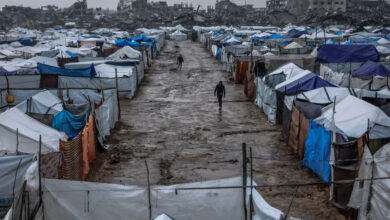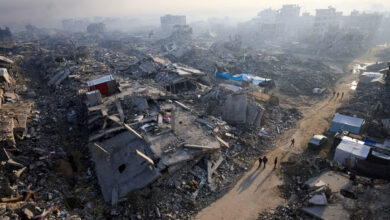Tunis — The Palestinian president said Wednesday he is opposed to another armed uprising against Israel, even if faltering peace efforts fail later this year.
Mahmoud Abbas told reporters in Tunisia that he remains committed to the US-backed target of reaching a negotiated peace agreement with Israel by September.
But with talks stalled for months, he repeated his plan to unilaterally seek UN endorsement of Palestinian independence in the absence of a deal.
Abbas said he would turn to the UN General Assembly, where he said he expects about 140 countries to vote in favor of an independent Palestine.
Since the assembly's decisions are not legally binding, the vote would be largely symbolic, and it remains unclear what the Palestinians will do after that.
At a news conference before heading to France, Abbas said, in answer to a question, that the Palestinians would not unilaterally proclaim a state.
"We want this to come about in accord with the Israelis and in the framework of the United Nations," the Palestinian leader said.
Abbas said whatever happens, he did not consider violence an option. "I will not accept a third military uprising," he said, noting that the last armed uprising against Israel "was disastrous for us."
Around 6,000 Palestinians, along with more than 1,000 Israelis, were killed in years of fighting that erupted in September 2000. The fighting also heavily damaged the Palestinian economy.
Abbas said he still supported "popular resistance" — or demonstrations — against Israel's occupation of the West Bank. Israel says these demonstrations often turn violent, and activists are sporadically wounded, or even killed, in clashes with Israeli forces.
"We have the popular resistance," he said. "But to say that you want to hold a gun or pistol to fight, then excuse me, I will not allow that as long as I'm the president."
Abbas called on the international community, in particular Washington, to pressure Israel to restart negotiations, saying that "if Israel shows a serious willingness to negotiate, for our part we want to reach a solution."
He said that, while in Paris, he would ask French President Nicolas Sarkozy to give new momentum to the peace process through the Quartet — the EU, the US, the UN and Russia.
Israel and the Palestinians relaunched peace talks in September at the White House, where President Barack Obama pledged to forge a peace deal within a year.
The talks broke down just three weeks later after an Israeli moratorium on settlement construction expired. The Palestinians say there is no point in negotiating if Israel continues to build homes for Jews in the West Bank and east Jerusalem — captured territories the Palestinians claim for their future state.
Abbas has in the past said he will return to the negotiating table if Israel halts settlement construction and commits to a near-total withdrawal from the West Bank and east Jerusalem.
In Tunis on Wednesday, he said vaguely that "there need be no pretexts."
Israeli Prime Minister Benjamin Netanyahu says peace talks should start without any preconditions.
September is shaping up to be a key month for peace efforts. The Palestinians say that in the absence of a peace deal, they will take their case to the United Nations.
While they can expect strong support in the General Assembly, it appears doubtful that they can win recognition from the more powerful Security Council.
The US, which wields veto power in the council, has been cool to the idea of a unilateral declaration of independence, saying Israel and the Palestinians must resolve their differences through negotiations.
The Palestinians won an important endorsement last week when donor states, which send hundreds of millions of dollars in aid each year, said institutions developed by the Palestinian Authority are now "above the threshold for a functioning state."
International support for the Palestinians has put heavy pressure on Netanyahu to offer his own diplomatic plan to end the impasse.
Netanyahu is expected to deliver a major policy speech to US Congress next month. But officials close to the prime minister say he has not yet decided what he plans to say.
Abbas, meanwhile, pointed an accusatory finger at Iran in addressing bitter divisions within Palestinian ranks, saying on private Nessa TV that Tehran was behind a blockage in reconciliation with the Islamist Hamas movement controlling the Gaza Strip.
"We are for unifying our ranks and not for a nation torn within," he said in a plea directed at Hamas and was hoping for a "positive response."




